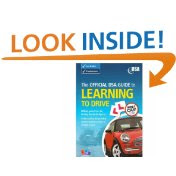Keep it legal. Stick to the legal requirements of your provisional driving licence, by making sure you have a supervising driver aged 21 or more who has held a full british licence (in the appropriate category, Automtic can not supervise in a manual car) for at least 3 years. You must also display regulation 'L' plates on the car being used for tuition purposes, and finally make sure you are fully insured against a minimum of 3rd party incidents while out on the road learning the driving skills required to pass the practical car driving test.
Know the standards expected by the DVSA driving examiner. This is where a lot of people learning to drive with a family member or friend go wrong, they get taught to drive the way their supervisor handles the car, not what is required to pass the test, and this is why most don't pass on their first attempt!
If you want to have a very good chance of passing the driving test while learning to drive without an instructor, I strongly suggest you buy the two books listed below, one is an offical book by the DVSA who conduct the practical assessment, while the other is the most important book that any learner driver in the UK should buy.
If there is one book you should buy, it is the Highway code as it tells you how the DSA examiner expects you to deal with anything you come across on the driving test. I know many good drivers who have failed due to silly mistakes they made because of a lack of konwledge of the highway code, for less than £5 they could have avoided the expense of a second test with the DSA people. The book is small enough for you to carry around with you, so take the time to know the rules inside out, it will go along way to guarantee your success in the practical car assessment.


The more knowledge you have of what is expected by the examiner, the better prepared you will be.
Finally with the internet of today, there is no excuse for not taking advantage of the many driving test tips websites and forums that are out there giving you practical and up to date advice, remember that whoever is supervising you while learning to drive without an instructor would have taken their test at least three years ago, and a lot could have changed in that time.
Suggested learner driver reading
Manual or Automatic driving lessons for a learner?
Cheap Driving Lessons.
Learning To Drive On Motorways